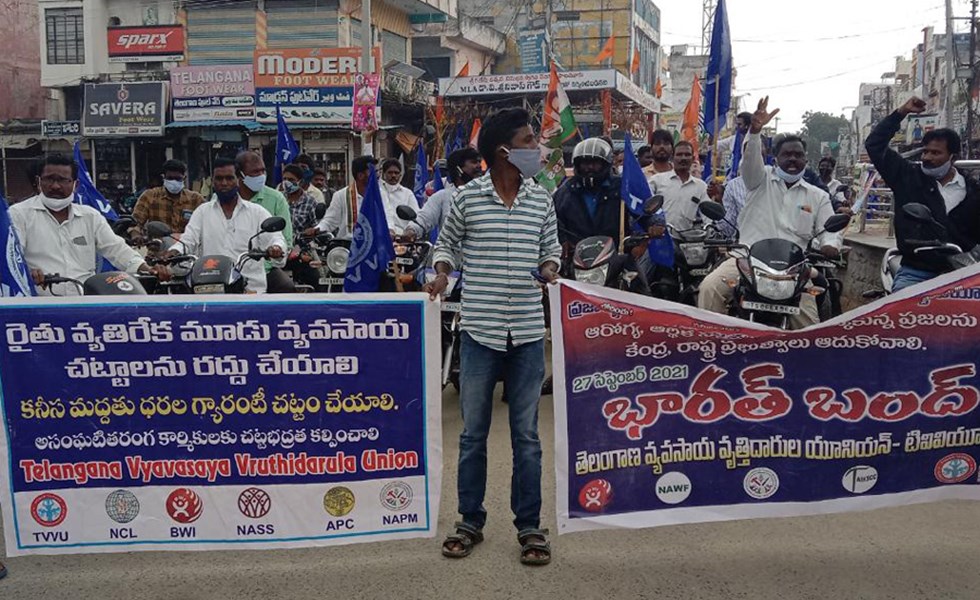Controversial Indian farm laws repealed
A victory, that’s how Indian Prime Minister Modi’s decision to scrap three controversial farm laws was greeted by the farmers. During the course of nearly a year of agitation against these laws, as many as 700 demonstrators lost their lives. In any event, the protests are set to continue. As agricultural workers’ union, Mondiaal FNV’s partner APVVU is engaged in the protests. “The laws have been scrapped but we’re not there yet.”

Election stunt by Prime Minister
On 19 November Prime Minister Modi announced that the three farm laws would be repealed. However, the Prime Minister does not himself have the power to repeal laws. This is done by Parliament. Which is what accordingly took place, on 1 December. “The farmers definitely saw this as a victory”, says APVVU coordinator Chennaiah Poguri. “While at the same clearly realising that it is an election stunt. Modi’s party BJP fears a massive loss of votes at the regional elections in three highly populated federal states next year. This will also put the farmers in a comfortable position”, he laughs.
A disaster for agriculture
Because the fight will go on. Two of the farmers’ demands in the farmers’ protests have not yet been complied with. The first is the withdrawal of the bill that would make farmers pay for the electricity that they need to run their businesses. In a number of federal states farmers get this free of charge, because agricultural products are of vital importance. In the future, all the farmers, rich or poor, will have to pay the same amount, which they are unwilling and unable to do. The second demand is for the Minimum Support Price, which the government imposes every year for each crop, to be given a legal framework so that everyone actually does adhere to it, because currently the farmers often do not receive a fair price for their fruit or vegetables. The farmers fear that this will be a disaster for agriculture.
Other points of contention
“The farmers are clever”, says Poguri. “It’s all well and good that Modi has scrapped the farm laws, but we’re not there yet. And there are other points of contention. Who is responsible for those 700 deaths during the protests? There was a huge accident, caused by the son of a minister, when his car ploughed into a group of demonstrating farmers, killing eight. The son is still a free man and the minister is still at his post. This is also what they are protesting about. All the agricultural unions support the farmers. We held a national union meeting at the weekend to prepare new demonstrations.”
Video IndiaToday
Farm laws and the protests
Modi’s government used the corona period to rush three hated farm laws through parliament. In any case, this is how his opponents view his action. The laws were supposedly intended to help the farmers, but worked out negatively (see box). The protest quickly swelled . In Delhi, in particular, the clashes between demonstrating farmers and police were heavy. On 26 January of this year, for example, the protest was so massive that a 27-year-old demonstrator lost his life when his tractor ran up against a police barricade. That day, 300 police officers were injured and 400 demonstrators arrested. In total, the protests have cost the lives of over 700 farmers. There were also major demonstrations in the south.
What do these farm laws mean?
What do these farm laws mean?
- The Farmers’ Produce Trade and Commerce (Promotion and Facilitation) Act sets up a mechanism allowing the farmers to sell their farm produces outside the Agriculture Produce Market Committees (APMCs), free of tax. However, in reality, the farmers do not derive any benefit from this new situation, because they are not in a position to travel endlessly for the best price. If the price is better 200 kilometres away, the farmer has to travel 6 hours on the Indian roads, which aren’t all that good.
- The Farmers (Empowerment and Protection) Agreement of Price Assurance and Farm Services Act allows farmers to do contract farming and market their produces freely at mutually agreed prices. This law is intended to stimulate farmer cooperatives, to enable them to bargain jointly. But farmers have always worked individually and do not see themselves suddenly working in cooperatives. Which in practice means being bought up by big companies, which will want to produce their seeds themselves.
- The Essential Commodities Act frees up items such as food grains, pulses, edible oils and onion for trade, except in crisis situations. This law appears very farmer-friendly, but works out randomly and creates unfair competition. Rice for the poor, for example, costs 1 rupee per 20 kilos, while on the free market, 20 kilos would cost 60 rupees. This means it is more advantageous for the middlemen not to take the rice to the poor, but to put it on the market direct. A great deal of corruption is going on under this system.
